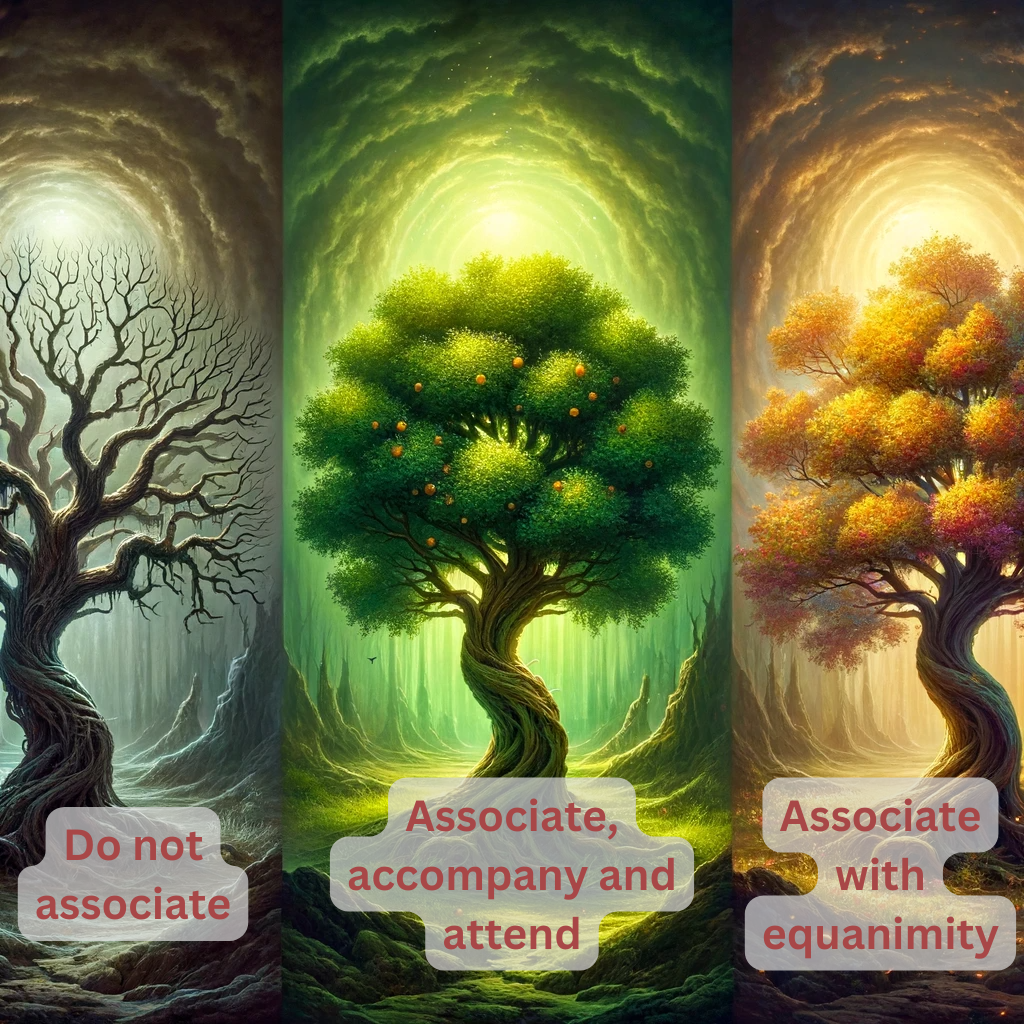
“These three people are found in the world. What three? There is a person who you should be disgusted by, and you shouldn’t associate with, accompany, or attend them. There is a person you should regard with equanimity, and you shouldn’t associate with, accompany, or attend them. There is a person you should associate with, accompany, and attend.
Who is the person you should be disgusted by, and not associate with, accompany, or attend? It’s a person who is unethical, of bad qualities, filthy, with suspicious behavior, underhand, no true ascetic or spiritual practitioner—though claiming to be one—rotten inside, corrupt, and depraved. You should be disgusted by such a person, and you shouldn’t associate with, accompany, or attend them. Why is that? Even if you don’t follow the example of such a person, you still get a bad reputation: ‘That individual has bad friends, companions, and associates.’ They’re like a snake that’s been living in a pile of dung. Even if it doesn’t bite, it’ll still rub off on you. In the same way, even if you don’t follow the example of such a person, you still get a bad reputation: ‘That individual has bad friends, companions, and associates.’ That’s why you should be disgusted by such a person, and you shouldn’t associate with, accompany, or attend them.
Who is the person you should regard with equanimity, and not associate with, accompany, or attend? It’s a person who is irritable and bad-tempered. Even when lightly criticized they lose their temper, becoming annoyed, hostile, and hard-hearted, and they display annoyance, hate, and bitterness. They’re like a festering sore, which, when you hit it with a stick or a stone, discharges even more. In the same way, someone is irritable and bad-tempered. They’re like a firebrand of pale-moon ebony, which, when you hit it with a stick or a stone, sizzles and crackles even more. In the same way, someone is irritable and bad-tempered. They’re like a sewer, which, when you stir it with a stick or a stone, stinks even more. In the same way, someone is irritable and bad-tempered. Even when lightly criticized they lose their temper, becoming annoyed, hostile, and hard-hearted, and they display annoyance, hate, and bitterness. You should regard such a person with equanimity, and you shouldn’t associate with, accompany, or attend them. Why is that? Thinking, ‘They might abuse or insult me, or do me harm.’ That’s why you should regard such a person with equanimity, and you shouldn’t associate with, accompany, or attend them.
Who is the person you should associate with, accompany, and attend? It’s someone who is ethical, of good character. You should associate with, accompany, and attend such a person. Why is that? Even if you don’t follow the example of such a person, you still get a good reputation: ‘That individual has good friends, companions, and associates.’ That’s why you should associate with, accompany, and attend such a person.
These are the three people found in the world.
A man who associates with an inferior goes downhill,but associating with an equal, you’ll never decline;following the best, you’ll quickly rise up,so you should keep companywith people better than you.”
The Buddha shares guideline on choosing one’s associations and company. For it is through associations that one can decline, avoid decline or grow in qualities.
- By associating with a person who is unethical, one is giving rise to the same qualities, leading to decline.
- By associating with a person of bad temper, with ill-ill, one is giving rise to similar qualities, leading to decline.
- By associating with a person who is ethical, one is giving rise to similar qualities in oneself, leading to their growth, not decline.
Related teachings:
- Teachings on the eight harmful and beneficial qualities (external link)
- Another discourse on who to associate with
- Factors to cultivate faith (association with wise is one of the four factors) (external link)
- Moral law of attraction (external link)
Ugh, The repetition, I thought I was losing my mind, so I went back and quantified it and categorized it and numbered it and now I see I was not losing my mind, he was indeed repeating himself.
- It’s a person who is irritable and bad-tempered.
- Even when lightly criticized they lose their temper, becoming annoyed, hostile, and hard-hearted, and they display annoyance, hate, and bitterness.
- They’re like a festering sore, which, when you hit it with a stick or a stone, discharges even more.
- In the same way, someone is irritable and bad-tempered.
- They’re like a firebrand of pale-moon ebony, which, when you hit it with a stick or a stone, sizzles and crackles even more.
- In the same way, someone is irritable and bad-tempered.
- They’re like a sewer, which, when you stir it with a stick or a stone, stinks even more.
- In the same way, someone is irritable and bad-tempered.
- Even when lightly criticized they lose their temper, becoming annoyed, hostile, and hard-hearted, and they display annoyance, hate, and bitterness.
wow, good job! The teachings have a lot of repetition to distinguish a subtle detail as they were orally transmitted for a few hundred years until being written down.
Not a Buddhist here, just chiming in and positing.
I feel like there’s at very least a 4th category, of someone who doesn’t exactly align with one’s standards, but the person also doesn’t exactly exhibit reproachable qualities. These people I will associate with, but in limited capacity and forum.
Or does that kind-of fit into the defined third category, but just with additional personal conditions?
They would be in the third category: If a person is exhibiting good ethics, they are worth accompanying and attending. As just by association with them, one gets a good reputation.
There is another teaching where the Buddha shares about a person who has higher ethics, immersion (concentration) and wisdom, one should associate and attend to such a person with honor, as this association will lead one to cultivate the same qualities.
I dig this Buddha who’s like: “some people are snakes in a pile of dung… you should be disgusted by them!” True, fam, true…
I’m confused how verses like these square with tenet personality qualities like a non-judgmental persona. I understand that part of the reason these people are not worth your time is because of their attachments, internal conflicts, and likely their own judgments. But, the verse feels overwhelmingly about “these awful people” and less focused on “these are good people.” It feels off because of how judgmental it reads to me.
I read it as a warning on choosing who to associate with and who to avoid. Here’s another teaching that frames it in positive: https://lemmy.world/post/10788878. The Buddha often taught in both ways to ensure his teachings were well-understood.
There is an openness to interpretation of this being judgemental with the very vivid simile, but when you see the Buddha’s teachings as a whole, the interpretation that applies here is one of cultivating discernment on who to associate with. There is a subtle but important distinction between the two: discernment is you cultivating wisdom about the world, of the good and the bad without creating ill-will or judging others. You can see this being true when you also read: https://suttacentral.net/mn21/en/sujato, where he recommends maintaining a mind of love even if somebody were to sever you limb by limb with a saw. The Buddha uses these very vivid similes to convey how to apply the teachings.
On the association aspect, it’s a very crucial aspect as it is the single external force that enables one to either cultivate and grow in spiritualities or leads to decline in their qualities. And this isn’t as well understood.
Thank you. I’ll read through these.


